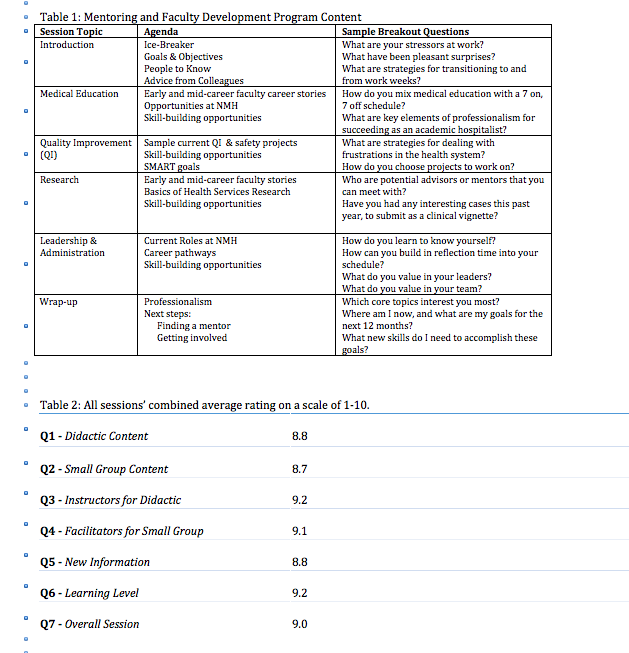Background: Mentorship is key to successful, satisfying, and engaging academic careers. Models for mentorship and faculty development exist, but are often resource-intensive and focused on achieving success in research. Establishing mentorship in hospital medicine has been challenging given most programs have relatively few senior faculty, and most new hospitalists are recent residency graduates with little formal training in academia.
Purpose: To create a replicable and scalable mentorship and faculty development program for academic hospitalists.
Description: We first conducted a needs assessment of early career faculty. Most were interested in mentorship, but lacked comfort with the process of finding a mentor, and lacked familiarity with skill development opportunities in key areas of academic hospital medicine such as medical education, quality improvement/patient safety, health services research, and leadership/administration. With this information, we established the following goals for the program: 1) increase knowledge and awareness of opportunities in core areas of academic hospital medicine, 2) build relationships among early and mid-career faculty, and 3) provide a forum for supportive discussion among peers. Fifteen early career faculty participated and four mid-career faculty served as mentors and facilitators. Six sessions of 1.5 hours each were split into brief, interactive presentations followed by small group discussion. Topics consisted of the four areas listed above and a final session dedicated to professionalism and next steps (see Table 1). Early small group discussions focused on resident to attending transitions, while later ones focused on career and personal development. Sessions were held early evenings, with food, to allow both on- and off-service hospitalists to participate. Attendance averaged 64%. Participants rated the sessions highly (see Table 2) and provided favorable comments and suggestions for improvement. For example, one participant stated, “I thought this was great… [I] got excited about quality improvement.” Another said, “Excellent session. Would love to have a 2.0 session on academic/research opportunities.”
Conclusions: A mentorship and faculty development program summarizing key topics in academic hospital medicine and using facilitated small group discussion was perceived as valuable to early career faculty. With its emphasis on peer mentorship and practical logistics, we believe this model is replicable at other institutions. At the request of participants, we are now implementing a Level 2 program.
